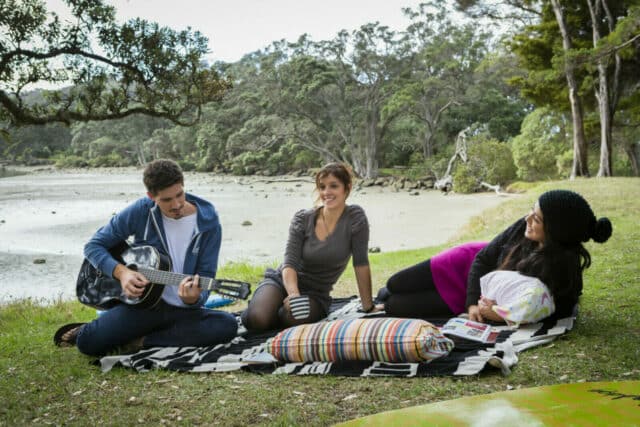Social Interactions | Pāpori
Written by Rachael Wiltshire

Image of diverse group of university students working with each other and their lecturer. This is a stock image with actors.
Understanding Social Challenges
Contrary to common stereotypes, Autistic people do want and need friendships and other supportive social relationships. Tertiary education can be a particularly challenging time for Autistic learners in terms of forming and maintaining supportive social relationships; whereas at school you interact with the same people in class each day, in a large tertiary course there may be little opportunity to interact with others regularly unless you know how to seek out those interactions yourself. Furthermore, moving away from home can mean you lose whatever existing support network you did have, with one learner in our survey noting: “To go to uni, I had to move away from home into a city for the first time, so I had no support network.”
Survey Findings
Group work presented a major social challenge for the Autistic tertiary learners who responded to our survey.
Learners also often struggled to create meaningful relationships on campus, despite recognising the importance of strong social connections.
Support for Social Interaction and Connection

Image of university students spending quality time with each other. This is a stock image with actors.
Autistic people can find engaging socially with neurotypical people to be both challenging and exhausting, as they often feel pressure to mask their Autistic traits so that they fit in (Crompton et al., 2020). However, many Autistic people report that they feel much more at ease around other Autistic people, and Autistic-led peer support programmes have been shown to be an effective way of supporting Autistic people (Crane et al., 2021). Thus, one way in which you can support your Autistic learners to connect socially is to advocate for a peer support group for neurodivergent students to be available on campus.
If a peer support group is not available, another option would be to suggest that the learner tries a club that caters to their interests, as they are likely to meet like-minded people in such an environment.
Many of the respondents in our survey appreciated being able to form close working relationships with their teachers. For example, one student explained that “I was very lucky to have perceptive and kind supervisors who were always supportive and somehow had an inkling of my difficulty in social situations. They focused on my work, helped when they could, and were never intrusive.” Whilst there are obviously ethical reasons why making friends with learners is not appropriate, being open to connecting with them as people, for example by actively inviting people to come and talk to you after class or during office hours, can go a long way to helping ensure Autistic learners get the chance to have meaningful social interactions in their day.
Group Work

Image of a group of students enjoying each others’ company. This is a stock image with actors.
Group work presented a major challenge for the students in our survey, with the stress of being required to work in a group often getting in the way of them actually learning anything, as these two examples show:
“I don’t have any problems with the content of the group work but having to work with others is very challenging. When I’m not under stress (working alone) I can complete the work to a better standard and in less time.”
“Many courses state that group work is an important part of learning which is why it is compulsory. For most people this is true. However, for me the anxiety I get when working with others is so debilitating that I usually can’t contribute to the group work at all. This basically means I’m only burdening the group and putting myself in an awful situation. This doesn’t benefit anyone’s learning at all and goes against the whole reason for group work in the first place. The ability to work independently should be a given option and not something that I should have to directly ask for.”
Before group work is assigned, it is important to question the rationale behind it, as this learner explained: “Personally, I would like group work to always be optional or not included at all, unless you’re on a career-specific course that is preparing you for a specific career where group work is required. My view is that the role of a university, especially if you are doing an arts or science degree, is to develop intellectual skills, not to make you ‘job-ready’- and the way group work works at university doesn’t really match how working with others works on the job anyway!” Unless group work is absolutely required to fulfil the objectives of the course, learners should have the opportunity to opt-out if they would prefer to do the task on their own. Where learners must work in a group to develop the skills that they need to graduate, keep in mind that many of the group tasks assigned in educational settings don’t actually mirror the way that working with others works in the real world (Green, 2016). When students are assigned group work, they are generally expected to reach decisions by consensus, whereas in the workplace there is normally a leader who can make decisions where needed. Learners are also often expected to coordinate their schedules to find time to meet to work on the project in their own time; something you would never be expected to do in the workplace. Finally, in a job your income is not determined based on the output of the group, whereas in a group project your grade often is.
You can support Autistic learners by:
- Pointing learners in the direction of neurodivergent peer support networks, or clubs on campus that cater to their interests. Students may not be aware of what clubs and support networks exist or how to sign up for them. As a university staff member, you could summarise what is available during an introductory lecture and emphasise that oining a club is a good way of making social connections on campus. You could also discuss this information individually with learners who seem to be struggling socially.
- Actively building supportive working relationships with learners. In a smaller course, you can get to know each individual learner and tailor your teaching to their needs. Whilst this is not possible on a larger course, being open to students stopping by after class or during office hours for a quick chat means that students who struggle to interact socially with their peers can still have meaningful social interactions in their day.
- Giving learners the ability to opt-out of group work wherever possible. Unless group work is an integral part of meeting the course objectives, learners should have the opportunity to complete group assignments individually if they would prefer.”
- Rethinking how you do group work. If group work is an absolutely non-negotiable part of your course, you can make it less stressful and more reflective of the real world by:
-
- Ensuring learners get to work with people they know, just like they would do in the workplace. This might mean waiting until later in the semester to do group work, so that everyone has had a chance to meet each other.
- Giving learners enough time during class to complete the project or at least enough time to discuss the project and delegate tasks that need to be completed by the next class. This serves two purposes: it means that learners don’t have to worry about coordinating their schedules to find a time to meet, and it also means that you can monitor how the groups are working and intervene if there is a problem.
- Assigning each person an individual grade, based on their contribution to the project. You could grade people on how well they worked with their group, on the output, or on a combination of the two (just ensure that the students understand what they are being graded on). If you are grading how well people worked with their group, you might ask each member of the group for anonymous feedback on each other, but it is important to also take your own observations into consideration to avoid unfairly punishing learners simply because other members of their group did not like them. If you are grading the output, ask each group member to clearly state what they worked on; otherwise, the risk is that one person will do all the work so that they don’t get a low grade.
- Incorporating group-learning experiences into your teaching instead of using group projects as assessments. This approach means learners get practice in working with others without the stress that traditional group projects entail.
Final Words
People learn best when they feel safe and supported in their relationships with their teachers and peers. By helping your Autistic learners to form meaningful relationships, you are supporting them to get the most out of their time in tertiary education.
Download Social Interactions PDF
References
Crane, L., Hearst, C., Ashworth, M., Davies, J., & Hill, E.L. (2021). Supporting newly identified or diagnosed autistic adults: an initial evaluation of an autistic-led programme. Journal of Autism and Developmental Disorders, 51, 892-905.
Crompton, C.J., Hallett, S., Ropar, D., Flynn, E., & Fletcher-Watson, S. (2020). ‘I never realised everyone felt as happy as I do when I am around autistic people’: a thematic analysis of autistic adults’ relationships with autistic and neurotypical friends and family. Autism, 24(6), 1438-1448.
‘I never realised everybody felt as happy as I do when I am around autistic people’: A thematic analysis of autistic adults’ relationships with autistic and neurotypical friends and family – Catherine J Crompton, Sonny Hallett, Danielle Ropar, Emma Flynn, Sue Fletcher-Watson, 2020 (sagepub.com): https://journals.sagepub.com/doi/10.1177/1362361320908976
Green, A. (2016, July 25). No, group work in school is not “just like in the real work world”. Ask a Manager.
no, group work in school is not “just like in the real work world” — Ask a Manager

Dancer Rachael Wiltshire. Photo credit: Stephen A’Court. COPYRIGHT ©Stephen A’Court
About Rachael Wiltshire
Rachael Wiltshire is an Autistic person and a member of the Altogether Autism Consumer Advisory Group. She is passionate about increasing societal awareness of neurodiversity and designing systems that are flexible enough to meet everyone’s individual needs. She is particularly interested in education and enjoys working with other neurodivergent students in a peer support and tutoring capacity.
Check out other guides in the series:

